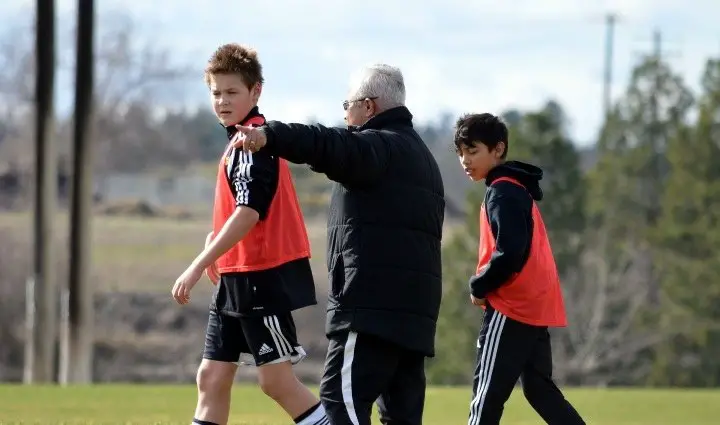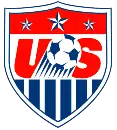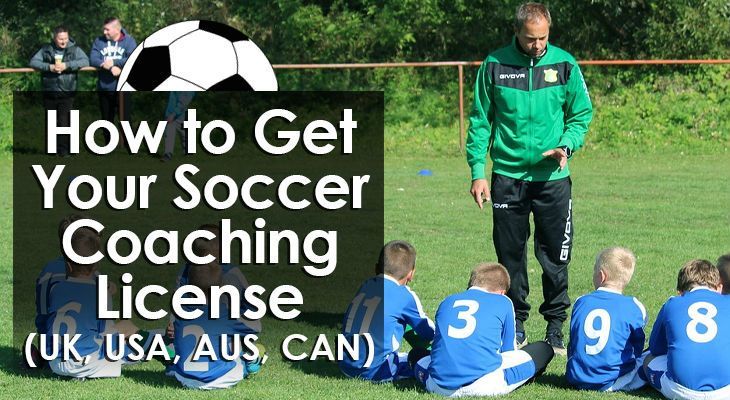How to Get a Soccer Coaching License (Any Country)
While many people start off coaching a team with relatively little experience other than having played soccer themselves, there does come a time when you need to start thinking about how to get your soccer coaching license.
This is because as you work your way up the ladder, greater pressures and responsibilities are placed on the coach.
The higher you progress, the greater the need for a coaching license.
While it does take some time, effort, and, at times, money, it is well worth investing in a course or qualification that helps you improve as a coach.
Not only will you enhance your own skills and technical and tactical knowledge, you'll also learn how to communicate clearly, be a leader and motivate, and improve your players to the best of your abilities.
As a million and one different things go into coaching a team, there is always some aspect or another that you can work upon and improve.
With that in mind, let's take a look at how to get your soccer coaching license!
Why Get Your Soccer Coaching License?
All around the world, soccer coaches dedicate their time, effort, and passion to supporting players improve and develop their skills.
While it can be tough at times, soccer coaching is very much a labour of love with just as many fun and rewarding moments for you to cherish.
Watching your players improve for instance and grow as people not just on the pitch but off it is very satisfying and is well worth all the effort you put in.
If you're already putting so much time and energy into learning how to become a coach, is it really necessary to get a soccer coaching license?
Why do people get them and what benefits do they bring?
a. Necessity
As we have already seen, coaching the youngest age groups often doesn't require a license.
This means that you don't really need to get a coaching qualification if you're not interested in progressing above a certain age group.
Later on, however, is becomes more and more necessary.
In most systems involving advanced players you are only allowed to coach if you have your coaching badges.
This is because you need to put on increasingly complicated drills and training sessions that challenge the players and helps them improve.
You'll also need to work on such things as their positioning, technique, and tactical knowledge of the game.
For most coaches, gaining their coaching license becomes a matter of necessity as they slowly work their way through the ages groups.
b. Enjoyment
Besides the necessity of gaining a qualification, completing your license will also help you to feel more comfortable and at ease while coaching.
This is because you will feel secure in your knowledge + skills and know exactly how to put on great training sessions which are fun and challenging.
In addition to this, you will also understand the principles behind different tactics and strategies and be able to clearly and concisely explain your thoughts and methods to the team.
c. Free (Nearly!)
While this doesn't apply to all clubs, many of them invest in their coaches and either contribute to or pay in full the soccer coaching license fees.
It’s in everyone's interest to see the players and coaches at the club to flourish and grow, so more often than not the club has some finances which they put towards these qualifications.
They will also often have relationships with the local soccer governing body and know when these trainings take place, when you can enrol, and how much it costs.
Besides looking into the various coaching badges yourself, it’s well worth asking other coaches at the club how they gained their qualifications and if there is any support available to you.
As we will see later, each country has its own set up for soccer coaching licenses, so practices vary considerably between them.
Well, why not get one?
With all of the time and energy you already expend thinking about soccer, how to set your team up, and get the best out of your players, why NOT work on your coaching badges?
With so much for you to take into account each and every week and weekend, it’s well worth investing in a soccer coaching license so that you are better prepared and can really help your players flourish and grow.
The benefits are almost endless and will see you drastically improve your skills and increase your knowledge of the beautiful game.
Now that we've seen some of the reasons why people get their soccer coaching license, let's take a look at what getting one actually involves.

What Does Getting Your Soccer Coaching License Involve?
As you already know, a soccer coach's role encompasses a multitude of different duties and responsibilities.
This means that you not only have to be a coach and manager to the team, but also a leader, role-model, and mentor to the players as well.
A coach needs to have many different skills and capabilities if they are to succeed and help develop / improve players to the best of their abilities.
While each soccer coaching level focuses on various areas of expertise, together they give you the skills, knowledge, and experience you need to keep improving as a coach.
In addition to the different areas they focus on such as conditioning or the mental side of the game, the badges also vary in terms of how long they take to complete.
Some can be done in days, others take weeks and several assessments.
Here are just some of the things you can expect to learn while working to gain your soccer coaching license:
How to Prepare and Run Training Sessions
— How to set up drills
— How to plan a well-balanced, efficient and productive session
— How to run an effective warm up
— How to run small-sided games
— How to keep players engaged, focused and motivated
— How to improve their fitness and stamina
— How to work on their technique
Strategies and Tactics
— The strengths and weaknesses of each formation
— How to set up a team
— How to decide on your tactical approach
— How to prepare your team for different game scenarios
— How to analyse how the game is going and what changes to make
— How to transition from defence to attack
— How to play different systems Communication skills
— How to give instructions and team talks
— How to give constructive criticism and feedback
— How to command your players' attention
— How to speak to parents and other stakeholders
— How to motivate and encourage players
— How to communicate positively
— How to relate and get the best from all player personalities
Leadership Skills
— How to act as a mentor and set a good example
— How to earn players' trust and respect
— How to manage squad dynamics
— How to increase players' confidence
— How to discipline a player in a firm but fair manner
— How to be an approachable authority figure
— How to create a fun, positive and welcoming atmosphere
In addition to these key skills and areas of expertise, you'll also learn about the laws of the game, nutrition, basic first aid, injury prevention, and a million other things related to the beautiful game.
If all that sounds useful to you, then it’s definitely worth checking out what coaching courses there are in your local area.
Let's now take a look at some of the soccer coaching licenses that you can find around the world.

How to Get Your Soccer Coaching License
The rules and regulations surrounding soccer coaching vary considerably depending on where you are and which age group you are working with.
While you often don't need a coaching qualification for younger age groups or amateur and informal teams, you will need one if you want to work with older age groups or adults.
This is because the competencies and responsibilities required of you increase in difficulty as you are expected to put on increasingly complicated and challenging training sessions.
Getting a soccer coaching license becomes not just a good idea and useful thing to have, but a necessity.
If you are interested in getting one then it is well worth asking your club to see what they suggest you do and whether there are any funds available to help you with the fee.
As each country has its own set up, you will need to do a bit research to see what coaching qualifications you need to work your way through.
To help you out, here is how you can get your soccer coaching license in a couple of different countries from around the world.
Australia

In Australia there are a couple of different paths you can go down depending on what level you'd like to coach at.
Their 'Community Courses' are primarily aimed at amateur coaches or even volunteers who intend to put on fun sessions at local clubs, schools, and universities.
These are shorter in nature and are more affordable with lots of different places around the country hosting the sessions.
If you are looking to work professionally as a coach then you'll be more interested in the 'Advanced Courses'.
These take longer to complete and are more intensive as they give you all the skills you need to make in the game.
To find out what soccer coaching licenses are available to you in Australia you can take a look here.
Canada

Canada Soccer also has a wide range of different coaching qualifications for you to work through.
Its Canada Soccer Pathway can take you from the grassroots level right up to the A License which qualifies you to work professionally.
If you're more interested in working with youngsters and focusing on recreational soccer than its Community Coach Stream is the one for you.
Here you'll work your way through a series of different workshops that steadily increase in difficulty and duration.
After the Active Start and FUNdamentals sessions, you can then complete the Learn to Train and Soccer for Life workshops.
All of these together qualify you to coach U13s soccer teams at the recreational level.
If you aspire to be a professional coach then it’s the Licensing Stream pathway that you'll want to follow.
Here you'll have to complete various modules and tasks before being evaluated and assessed at the end of each level.
After completing your C License which takes around 32 hours to finish, you can then move on to ‘B License - Part 1’ and then on to ‘B License - National’.
Together, these take around 80 hours to complete.
After that you only have the A License left and it takes around 90 hours to gain the country's highest coaching qualification.
To find out more about Canada Soccer and its various soccer coaching licenses, take a look here.
The United Kingdom

As it is the home of soccer, it should come as no surprise to learn that in the UK there are an astounding range of different coaching qualifications for you to complete.
The FA puts on fabulous coaching courses all around the country, so if you are in the UK it’s worth taking a look to see what is available to you.
At the lowest level, the FA Level 1 course introduces you to the basics of the game and teaches you how to put on fun and engaging training sessions for players up to the age of 7.
This takes around 43 hours to complete and once you have the qualification you can then start working on your next badge.
At the highest level is the FA Level 5 course.
This takes 18 months to complete and once you have it you are eligible to coach as a manager in the Premier League if you can make it!
It’s a very comprehensive course and takes you through everything you need to know to make it to the top of the game.
Besides these coaching badges, there are also a wide range of qualifications you can work on with the FA depending on your interests.
For example, they have medical first aid courses as well as courses on how to scout players or work with deaf, blind, and disabled players.
To have a look at all of the different courses available to you in the UK, take a look here.
The United States of America

US Soccer also has different pathways for you to follow.
These take various durations to complete, and are increasing difficult the higher you go.
At the start of your coaching journey, the “Introduction to Grassroots Coaching” only takes 20 minutes to complete and can be done online.
While later modules and workshops demand your presence, you can actually complete quite a few of the earlier qualifications online.
These teach you how to run small matches and set up age appropriate training sessions.
In addition to the Grassroots Courses, there are also some tougher and more time consuming qualifications for aspiring coaches to work through.
Starting off with the D Course, these progress in difficulty until you arrive at the Pro Course which qualifies you to work professionally in the US with soccer players.
Over the duration of the 12 month course you'll need to attend training sessions, meetings, and webinars, as well as visit clubs and listen to expert guest speakers.
While some of these courses can be completed quite simply and quickly, others require you to already have a couple of years coaching experience before you apply.
If you are interested in US Soccer's coaching licenses then take a look here.
Conclusion
At all levels of the beautiful game, coaches play a vital role in ensuring that players not only enjoy their soccer but develop and improve their skills.
While you don't need a soccer coaching license when you first start out, later on it becomes increasingly important that you have one.
Besides teaching you everything about running a soccer team, licenses will give you a wide range of skills that can be used in any walk of life.
In addition to this, it will also increase your enjoyment of coaching a team as it equips you with all the knowledge you need to do a great job.
Whether you're looking to improve your player-management, communication / leadership skills, or your technical / tactical knowledge, it is well worth investing in a soccer coaching license.
Further Reading: How to Coach Soccer 101: 7 Rules for First-Time Coaches

